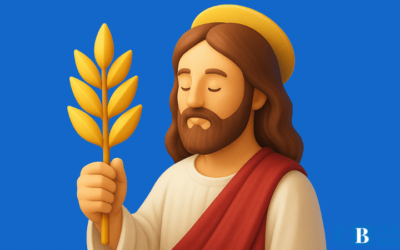What if you could hear Jesus directly explaining how faith should be lived in the real world?
He Sermon on the Mount It is not only one of the most famous speeches in history; it is the heart of Jesus' message about life, justice, character, and the Kingdom of GodIn just three chapters, Jesus redefines what it means to be truly blessed, to live with purpose, and to act with an authentic faith that transforms both the individual and those around them.
From the Beatitudes to the teaching of the Lord's Prayer, from loving one's enemies to building one's life on the rock, Each word has the power to confront, comfort, and change the sincere reader..
In this article you will discover:
- What exactly is the Sermon on the Mount and why is it still relevant today?
- How it is structured and what fundamental themes it addresses
- Why his teachings are as countercultural as they are revolutionary
- And how you can begin to live them, step by step, in your daily life
Get ready to explore the most transformative message ever spoken. Are you ready to climb the mountain and hear directly from the King?
What is the Sermon on the Mount and why is it so influential?
What if the most radical message about character, justice, and the Kingdom of God were contained in just three chapters of the Bible?
He Sermon on the Mount It is considered by many to be the most powerful, profound, and challenging teaching that Jesus ever gaveIt contains principles that transcend cultures, eras, and religions, and remains an ethical, spiritual, and social benchmark to this day.
It is a discourse that redefines what it means to be truly blessed, righteous, humble, and godly. Instead of focusing on external rituals, calls for a radical internal transformation, to live with purity of heart, active mercy and an authentic faith that impacts the world.
Location in the Gospel of Matthew and general context
The Sermon on the Mount is found in chapters 5, 6 and 7 of the Gospel of Matthew, and marks the beginning of Jesus' public ministry. After calling his first disciples and healing multitudes, Jesus goes up a mountain and begins to teach them (Matthew 5:1-2).
This moment is reminiscent of Moses at Sinai, but Jesus does not repeat the old law: he brings it to fulfillment and elevates it to its spiritual fullness.Matthew presents Jesus as the new Lawgiver, not from a mountain of fear, but from a mountain of grace.
The context is key: Jesus speaks to a Jewish audience under Roman oppression, in search of a political Messiah. Instead of proclaiming social revolution, Jesus proclaims a revolution of the heart.
To whom was this message from Jesus addressed?
Although Jesus was primarily addressing his disciples, the crowds were also present and listening (Matthew 5:1; 7:28). This tells us that the message is intended for both the engaged followers as to the spiritual seekers.
Jesus spoke:
- To the poor in spirit, who knew they needed God.
- To the hungry for justice, who longed for a restored world.
- To the simple and humble, who wanted to truly follow God.
The Sermon on the Mount is not just for religious leaders or the perfect. It is for all who wish to live according to the Kingdom of God, guided by truth, humility and love.
General structure of the Sermon on the Mount
Division by chapters: Matthew 5, 6 and 7
The Sermon on the Mount covers three complete chapters of the Gospel of Matthew (5 to 7), which makes it the longest recorded speech of Jesus in the gospels.
- Matthew 5: Start with the beatitudes and continues with teachings on the law, the character of the believer, forgiveness, purity, love of the enemy and the call to perfection.
- Matthew 6: It focuses on the interior life: prayer, fasting, generosity, trust in God, and freedom from material desires.
- Matthew 7: It includes warnings against unfair judgment, the golden rule, spiritual discernment, and ends with a radical call to obedience.
This order reveals a spiritual progression: from character → to practice → to personal response.
Key themes addressed by Jesus
Jesus does not offer a legal code, but a map of the heart of the KingdomSome essential topics:
- The nature of the true disciple
- The inner justice vs. outer appearance
- The healthy and restored human relationships
- The total dependence on God
- The obedience as a solid foundation
Each teaching points to a life lived under the Lordship of God, where the internal is as important as the external.
A speech with divine authority and practical wisdom
Unlike the scribes, Jesus taught with its own authority (Matthew 7:28-29). He did not quote other teachers: he spoke as one who had heavenly authority.
But his message was not only profound: it was practical. Instructions such as “love your enemies”, “do to others what you would receive” or “do not worry about tomorrow” are applicable in daily life, although deeply challenging.
The Sermon on the Mount It is not a lofty spiritual theory, but a guide to living on earth with the values of heaven.
The Beatitudes: The Character of the Kingdom Citizen
What does “blessed” mean?
The word “blessed” (from the Greek Makarios) does not simply mean “happy”, but “deeply blessed by God”.
- It does not depend on external circumstances.
- It is a spiritual state that reflects divine approval and communion with the Kingdom.
- Each beatitude describes a attitude of the heart that God honors.
Jesus declares blessed those whom the world does not value: poor in spirit, meek, merciful, persecuted...
The eight beatitudes explained one by one
- Poor in spirit: They recognize their need for God (Matthew 5:3).
- Those who cry: Sorrow for sin and for the suffering of the world (5:4).
- The meek: They do not react with violence or revenge (5:5).
- Those who hunger and thirst for justice: They desire God's will (5:6).
- The merciful ones: They extend forgiveness and compassion (5:7).
- Those of pure heart: They have pure intentions, without hypocrisy (5:8).
- The peacemakers: They promote peace instead of conflict (5:9).
- Those persecuted for the sake of justice: They suffer for their faithfulness to God (5:10).
These attitudes They are not optional ideals, but the standard of Kingdom character.
Values Inversion: The Kingdom of God vs. the World
The Beatitudes break with the logic of the world:
- The world exalts pride; Jesus blesses humility.
- The world values strength; Jesus values meekness.
- The world rewards the victor; Jesus exalts the one who suffers for the sake of good.
This contrast reveals that the Kingdom of God is a radical reversal of values, where what is despised by men is precious in the eyes of God.
Being part of the Kingdom implies live with a completely new mindset, countercultural and deeply transformative.
Identity and testimony: salt and light of the world
“You are the salt of the earth”
Jesus declares to his disciples: “You are the salt of the earth” (Matthew 5:13), a statement with enormous symbolic weight in the Jewish context.
Salt in ancient times was:
- Preservative: prevented corruption, as the believer must stop the advance of sin.
- Flavor giver: The Christian gives meaning and moral direction to a rudderless world.
- Element of agreement: In Leviticus 2:13, salt was part of the offerings, symbolizing permanence and purity.
But Jesus also warns: if salt loses its flavor, it's uselessIt is a call to authenticity and not to conform to the world.
“You are the light of the world”
Jesus continues: “You are the light of the world” (Matthew 5:14), linking his followers to one of the most powerful images in the Bible.
Light represents:
- Revealed truth: Christ's teaching must be visible and understandable.
- Hope in the darkness: the believer leads by example.
- A life that glorifies God: “…that they may see your good works and glorify your Father who is in heaven” (Matthew 5:16).
The light does not hide; must be placed “on the lampstand.” The Christian life is neither private nor passive: it is a public testimony to the power of the Kingdom.
Called to impact the world with our faith and conduct
Jesus does not invite his disciples to withdraw from the world, but to transform it from within.
- Being salt and light implies active presence, but not conformism.
- Demand integrity, humility and coherence between what is believed and what is lived.
- Our testimony It is not measured only by words, but by visible works.
The Sermon on the Mount makes it clear: The Kingdom is not only a spiritual experience, but a living mission that influences society with redemptive power.
Jesus and the Law: Fulfillment, Not Abolition
“I have not come to abolish the law, but to fulfill it.”
In Matthew 5:17, Jesus says:
“Do not think that I have come to abolish the Law or the Prophets; I have not come to abolish them, but to fulfill them.”
This means:
- Does not discard the Old Testament, affirms it and gives it full meaning.
- He is the prophetic and moral fulfillment of the law: his life, death and teaching fulfill what was announced by Moses and the prophets.
- The gospel does not replace the law, reveals it in its spiritual depth.
Jesus does not change the standard; change your heart to be able to live it.
True justice that surpasses that of the Pharisees
In Matthew 5:20, Jesus issues a radical warning:
“If your righteousness does not exceed that of the scribes and Pharisees, you will never enter the Kingdom of Heaven.”
The justice of the Kingdom:
- It is not based on external compliances or legalisms, but in a transformed heart.
- It goes beyond the visible, to the internal intentions.
- It's not about the quantity of rules, but about the quality of love, mercy, and truth.
Jesus denounces religious hypocrisy and promotes a justice lived from within.
Continuity and fullness in the teaching of Christ
Jesus He does not break the law, he takes it to its maximum expression. Examples in chapter 5 show this:
- Not only not to kill, but do not hate or insult.
- Not only not to adulterate, but not to desire with lust.
- Not only love your neighbor, but love the enemy.
This shows that the teaching of Christ is:
- Spiritual continuity: part of God's same plan.
- Ethical and moral plenitude: elevates the law to a more demanding and authentic experience.
- Comprehensive transformation: not only of what we do, but of who we are.
Jesus' message is clear: The Kingdom does not consist in ritual, but in a living relationship with God and with one's neighbor, based on love, truth and sincere obedience..
Ethical deepening: from act to intention
Not only kill, but avoid anger
Jesus teaches in Matthew 5:21–22:
“You have heard that it was said to those long ago, ‘You shall not murder…’ But I say to you that anyone who is angry with his brother will be subject to judgment.”
Here, Jesus reveals that:
- The problem does not start with homicide, but with anger and contempt in the heart.
- Words like “fool” or hateful attitudes too offend the holiness of God.
- The justice of the Kingdom demands pacify the soul, not just controlling the hands.
True obedience begins in the invisible, where intentions are forged.
Not only adultery, but avoid desire
In Matthew 5:27–28, Jesus declares:
“You have heard that it was said, ‘You shall not commit adultery…’ But I say to you that everyone who looks at a woman lustfully has already committed adultery with her in his heart.”
This teaching reveals:
- That Purity is not only physical, but mental and emotional.
- The disordered desire, cultivated in secret, violates God's plan of love.
- Jesus does not point only to external action, but to the internal root of sin.
His call is radical: “If your eye causes you to sin, tear it out…” (an extreme figure that reflects the urgency of holiness).
The true spirit of the moral law
Jesus teaches that Obeying the law is not just about avoiding “technically” sinning, but live in a state of purity, mercy and true love.
The spirit of the law:
- Seeks to restore relationships, not just condemn mistakes.
- Aim at the total integrity of the human being, not just to his public conduct.
- Invites you to a lifestyle guided by the Spirit, not by empty rules.
Christ redefines morality as an expression of the Kingdom in the heart, not a superficial fulfillment.
Principles of human relations according to Jesus
The importance of forgiveness and reconciliation
In Matthew 5:23–24, Jesus says:
“If you are bringing your gift to the altar and there remember that your brother has something against you… go first and be reconciled.”
This teaches that:
- The Relationship with neighbor directly affects the relationship with God.
- Worship is not acceptable if there is unresolved conflict.
- The believer must be proactive in restoring peace, even if he is not the direct culprit.
Forgiveness is not a secondary option, but a spiritual priority.
Love for enemies and prayer for those who persecute
Matthew 5:44:
“Love your enemies, bless those who curse you…”
Jesus brings love on a supernatural level:
- Not only loving the one who loves us, but also the one who hurts us.
- Pray for those who persecute us, do not respond with hatred.
- Show the mercy of the Father, who makes the sun rise on the just and the unjust (Matthew 5:45).
This love is not born from human effort, but of the Spirit of God in usIt is one of the most powerful signs of the Kingdom.
Renounce revenge, practice mercy
Jesus says:
“Whoever strikes you on the right cheek, turn to him the other also…” (Matthew 5:39)
This does not mean passivity in the face of injustice, but rather:
- Give up the desire for revenge, even when you are right.
- Disarm the attacker with an attitude overflowing with grace.
- Practice a mercy that reflects the heart of God, who forgives the offender and seeks his restoration.
The Kingdom of God It does not advance by force, but by the power of redeeming loveThis ethic is revolutionary… and profoundly transformative.
The Inner Life of the Disciple
Give, pray, and fast in secret
In Matthew 6:1–18, Jesus warns:
“Beware of practicing your righteousness before men…”.
The emphasis is on spirituality not being a spectacle, but a sincere expression of the heart toward God.
Jesus mentions three key practices:
- Give alms: not to receive approval, but as an act of compassion.
- Pray: not to be seen, but to have intimate communion with the Father.
- Fast: not with a sad face, but with inner joy.
The central principle: God sees the secret… and rewards the secret (Matthew 6:4, 6, 18). Authentic faith does not need human applause.
The model prayer: the Lord's Prayer
In Matthew 6:9–13, Jesus teaches a prayer that reveals the heart of the Kingdom and the relationship with God:
- “Our Father who art in heaven” – Intimate relationship with a sovereign God.
- “Hallowed be thy name” – Priority to the glory of God.
- “Thy Kingdom come” – I wish that His will govern.
- “Give us this day our daily bread” – Daily trust in provision.
- “Forgive us our debts” – Recognition of our need for grace.
- “Lead us not into temptation” – Dependence on living in holiness.
It is not a repetitive formula, but a structured guide to praying with purpose, humility, and faith.
The value of spiritual authenticity
Jesus insists that True spirituality is born from the heart, not of visible rituals or external appearances.
- God does not seek hollow religiosity, but deep sincerity.
- The disciple does not live to impress, but to obey.
- Spiritual life is constant, genuine, secret and fruitful.
Authenticity is the hallmark of the Kingdom. Jesus calls his followers to live a real faith that flows from intimacy with God, not from the need for human approval.
Treasures, worries and priorities
“Where your treasure is, there your heart will be also”
In Matthew 6:19–21, Jesus says:
“Do not lay up treasures on earth… but lay up treasures in heaven.”
This teaches:
- That what we value directs our attention, time and affection.
- That the material is temporary, but the spiritual is eternal.
- That the human heart aligns with your true priorities.
Jesus does not condemn goods, but yes, he rebukes attachment to themThe call is to invest in the Kingdom.
You cannot serve both God and riches
In Matthew 6:24, Jesus states forcefully:
“You cannot serve both God and money.”
This is not a suggestion, but a non-negotiable spiritual reality:
- The heart cannot be divided between two masters.
- Greed and faith cannot coexist in harmony.
- Money may be a good servant, but it is a destructive master.
Jesus calls one exclusive loyalty to the Kingdom, where God is the only Lord worthy of our love and obedience.
Trust in the providence and care of the Father
Matthew 6:25–34 is a call against anxiety:
“Do not worry about your life…”
Jesus gives reasons to trust:
- The Father feeds the birds and you saw the lilies… will it not take care of you?
- Anxiety doesn't add a single minute to your life.
- The Kingdom must be the priority: “Seek first the Kingdom of God and his righteousness… and all these things will be added to you” (v. 33).
Trusting in God is not passivity, but live with a practical faith in your daily care, without fear of the future or slavery to the present.
Relationships and judgment towards others
“Judge not, lest you be judged”
In Matthew 7:1–5, Jesus warns:
“Judge not, that ye be not judged.”
This phrase does not prohibit all judgment, but:
- Judging with hypocrisy, ignoring our own faults.
- Act as if we were moral authority over others without examining us.
- Measuring others with a hard rod, while we use compassion for ourselves.
Jesus calls us to the honest self-assessment before correcting others. Only with humility and grace can we help others grow.
The golden rule: “Do unto others as you would receive”
Matthew 7:12 sums up the entire ethic of the Kingdom in one sentence:
“So, whatever you want men to do to you, do also to them…”
This rule:
- Is proactive, not passive: doing good, not just avoiding evil.
- Summarizes the law and the prophets in a golden principle.
- Invites you to live with empathy, respect and active love.
When we treat others the way we want to be treated, The Kingdom is manifested in our relationships.
Right discernment: not giving what is holy to dogs
In Matthew 7:6, Jesus says:
“Do not give what is holy to dogs, nor throw your pearls before swine…”
Although we should not judge hypocritically, Yes, we must discern with wisdom:
- Some spiritual truths should not be shared indiscriminately with those who aggressively reject them.
- There are times when silence, prudence or retreat honor the gospel more than direct confrontation.
- The disciple must cultivate spiritual discernment, balancing compassion and common sense.
Jesus calls us to be loving and wise, guided by the Spirit in every interaction.
Final Exhortations of the Sermon
Ask, seek, and knock: persevering prayer
In Matthew 7:7–11, Jesus encourages:
“Ask… seek… knock… for everyone who asks receives…”
Here he teaches:
- A model of active and constant prayer.
- A portrait of God as Good Father, who gives “good things” to his children.
- The invitation to persist in the search for God with faith and confidence.
This promise shows that The relationship with God is close, secure and generous.
The narrow gate and the narrow way
In Matthew 7:13–14, Jesus presents a choice:
“Enter through the narrow gate…”
This passage teaches that:
- The life of the Kingdom It is neither popular nor easy.
- The narrow path represents obedience, renunciation and fidelity to Christ.
- The wide, though comfortable, road leads to destruction.
Jesus makes it clear that Discipleship requires determination, commitment, and perseverance, but his reward is eternal life.
The tree and its fruits: discerning true faith
In Matthew 7:15–20, Jesus warns against false prophets and deceptive teachings:
- “You will know them by their fruits.”
- Authenticity is measured by character and conduct, not just by words.
- A good tree bears good fruit; a bad tree bears corrupt fruit.
This metaphor also applies to the believer: Genuine faith is evidenced by visible fruits of love, truth and obedience.
It is not enough to appear to be a disciple, you have to live like one.
The house on the rock: obedience as a foundation
Hear and do vs. hear and not do
Jesus concludes the Sermon on the Mount with a powerful illustration (Matthew 7:24–27):
two men, two houses, two foundations.
- The fact that listen and put into practice It's like the wise man who built on the rock.
- The fact that He hears but does not obey It is like the fool who built on sand.
Both listen, both build, both face storms…
The difference is in obedience. Faith without action it's just appearance.
The disciple's firmness in the midst of trial
The storms in the parable represent the trials of life, crises, temptations and the final judgment.
- Only he who has his life based on Christ remains firm when everything trembles.
- Obedience does not avoid difficulties, but guarantees stability in the midst of them.
- The rock is not just listening to Jesus, is to truly follow him, with all your heart.
Jesus was not looking for admirers, but followers who live what they believe.
The contrast between obedience and superficiality
Both houses may look the same… until the storm hits.
Jesus shows us that:
- Religion without obedience is fragile.
- Appearances can be deceiving, but character is tested over time.
- The Kingdom is not built with pretty words, but with transformed lives.
Obedience is the true foundation of faith. Only in this way can one enter and remain in the Kingdom of Heaven.
Impact of the Sermon on the Mount throughout history
Influence on Christian leaders and ethical movements
The Sermon on the Mount has been a source of inspiration for thousands of believers and reformers:
- Augustine, Luther and Calvin They cited it as the theological basis of Christian life.
- Gandhi, although not a Christian, considered it the highest moral code.
- Martin Luther King Jr. and other leaders saw in his teachings the moral strength to resist evil with peace and love.
His words have ignited revivals, reformations, missions and social justice movements.
The Sermon on the Mount and the Ethics of the Kingdom
This sermon is the manifesto of the Kingdom of God.
Presents a radically different ethics to the world:
- Love your enemies
- Forgive without limit
- Seek God's justice rather than human recognition
- Living with humility, truth and inner purity
This is not a list of rules, but of a lifestyle transformed by the presence of God in the heart of the believer.
How this message has transformed lives and societies
Throughout the centuries, the Sermon on the Mount:
- Ha healed relationships, restored families and changed communities.
- He has guided thousands through times of crisis, oppression, or moral decisions.
- It has shown that The Kingdom of God is not only a future hope, but a present reality when its principles are lived today.
This message is not just for reading, it is for living.
And by living it, the world begins to change... from within.
Is it possible to live the Sermon on the Mount today?
Practical and spiritual challenges for today's believer
The Sermon on the Mount poses a countercultural ethic that deeply challenges the logic of the modern world:
- Loving enemies in a culture of hate.
- Living with inner purity amidst constant stimuli to greed and sensuality.
- Seek the Kingdom first when everything around us pushes toward individualism, materialism, and self-affirmation.
These teachings seem “impossible”, not because they are utopian, but because require a life guided and empowered by God himselfThey cannot be accomplished by human strength, but by spiritual surrender.
The role of the Holy Spirit in character transformation
Jesus didn't expect us to live the Sermon on the Mount alone. That's why, after his resurrection, He sent the Holy Spirit.
- The Spirit gives us new heart and new motivations (Ezekiel 36:26-27).
- It produces in us the fruit of the Kingdom: love, joy, peace, patience… (Galatians 5:22-23).
- It guides us, convinces us, strengthens us and transforms us live as citizens of heaven.
The Sermon on the Mount is not just an ideal, it is the portrait of a life surrendered to the Spirit and transformed by its power.
Personal and community application of Jesus' message
Living the Sermon on the Mount is a daily mission that touches all spheres of life:
- Personally: forgive those who hurt me, resist greed, pray sincerely, trust in God's provision.
- With family: cultivate meekness, reconciliation, mercy.
- In community and church: to be salt and light, to build a culture of grace, justice and truth.
- In society: reject corruption, defend the truth, love even those who think differently.
Every decision is an opportunity to live the Kingdom here and now. The Sermon on the Mount is not to be admired… it is to be embodied.
Book recommendations for further study
📘 “The Sermon on the Mount” – John Stott
A classic that combines clarity, theological depth, and practical application. Ideal for personal study, small groups, or pastoral teaching.
📘 “The Sermon on the Mount and Its Message” – Martyn Lloyd-Jones
A comprehensive and doctrinally rich work that explores verse by verse the power and spiritual weight of each teaching. Highly recommended for preachers and leaders.
📘 “Jesus: Historical Approach” – José Antonio Pagola
Although it doesn't directly comment on the sermon, it offers a historical and spiritual context for the real Jesus who spoke these words. It enriches our understanding of the message and its background.
Frequently Asked Questions About the Sermon on the Mount
Where is the Sermon on the Mount in the Bible?
The Sermon on the Mount is found in the Gospel of Matthew, Chapters 5, 6 and 7It is Jesus' first major public discourse and is located at the beginning of his ministry, after he had called his disciples and preached the Kingdom of Heaven.
What does it mean to be “blessed” according to Jesus?
To be blessed (from the Greek Makarios) means to be blessed by God, even under conditions that the world would not consider favorable. It is a declaration of divine approval about those who live according to the values of the Kingdom: humility, mercy, purity, justice, among others.
Did Jesus abolish or fulfill the Mosaic Law?
Jesus made it clear that He did not come to abolish the law, but to fulfill it (Matthew 5:17). He gave it its true meaning, elevating it to its highest spiritual expression. Not only did he fulfill the moral law perfectly, but he also taught its internal application, from the heart.
What teaching does the Lord's Prayer contain?
The Lord's Prayer (Matthew 6:9–13) is a model prayer that expresses:
- The intimate relationship with God as Father
- The priority of his Kingdom and his will
- The daily dependence on His provision and forgiveness
- The request for spiritual protection
It is a guide to praying with sincerity, balance, and heavenly focus.
Why is the Sermon on the Mount so important?
Because it is the clearest expression of the character of the Kingdom of God. Summarizes Jesus' ethics, spirituality, and vision for his disciples. Sample how those who follow Christ should live, in the world but not as the world. It has profoundly influenced Christian history, theology, culture, and ethics.
Is it possible to live according to these teachings?
Yes, but only through the work of the Holy Spirit in the heart of the believer. The teachings of the Sermon on the Mount are demanding, but not impossible. They are fruit of a transformed life for God, who surrenders to the Kingdom and lives by faith and obedience.
What is the relationship between this sermon and salvation?
The Sermon on the Mount It is not a condition for being saved, but a evidence of a saved life. It shows how someone who is born again lives, and reflects the fruit of the Kingdom in the character of the believer. It is a call to consistency between faith and conduct.
What did Jesus mean by “love your enemies”?
That Christian love goes beyond what is natural and what is deserved. Jesus calls his disciples to to love as God loves, even those who harm them. This implies forgive, pray for them, seek their good, and thus reflect the heart of the heavenly Father (Matthew 5:44–48).
What is the difference between the Sermon on the Mount and the Sermon on the Plain?
The Sermon on the Mount is in Matthew 5–7, while the Sermon on the Plain appears in Luke 6:17–49. Both contain similar teachings, but there are differences in style, emphasis, and detail. Some scholars believe they are different versions of the same speech, others that are different events with repeated messages in different contexts.
How to apply the Sermon on the Mount in daily life?
- Meditate on his teachings with prayer
- Ask the Holy Spirit to transform your character
- Practice forgiveness, humility, generosity and justice
- Living with internal and external coherence
- Be salt and light in the everyday environment
Apply the Sermon on the Mount is to build life on rock, with sincere obedience and active faith.
Conclusion
He Sermon on the Mount It is not a collection of pretty phrases nor an unattainable ideal. It is Jesus' radical call to live as citizens of the Kingdom here and now, with a transformed heart, an authentic faith and an ethic that shines amidst the darkness of the world.
Every teaching, from the beatitudes to building on the rock, challenges us to abandon religious superficiality and embrace a God-centered life, guided by his Spirit and marked by love, justice and truth.
Living the Sermon on the Mount is not easy, but it is possible—and deeply liberating—when we walk with Jesus as our Teacher, Savior, and King.
What part of the Sermon on the Mount has most challenged or transformed your life?
We'll read your comments. Share your experience and enrich others with your testimony!
Discover How the Bible Can Transform Your Life
- Bible Study – explore the teachings of the Bible and find answers to life’s challenges.
- Fundamental Beliefs – delves into the principles that have guided millions through the centuries.
- Spiritual Growth – Strengthen your faith with studies designed to bring you closer to God.

Discover How the Bible Can Transform Your Life
- Bible Study – explore the teachings of the Bible and find answers to life’s challenges.
- Fundamental Beliefs – delves into the principles that have guided millions through the centuries.
- Spiritual Growth – Strengthen your faith with studies designed to bring you closer to God.



























0 Comments